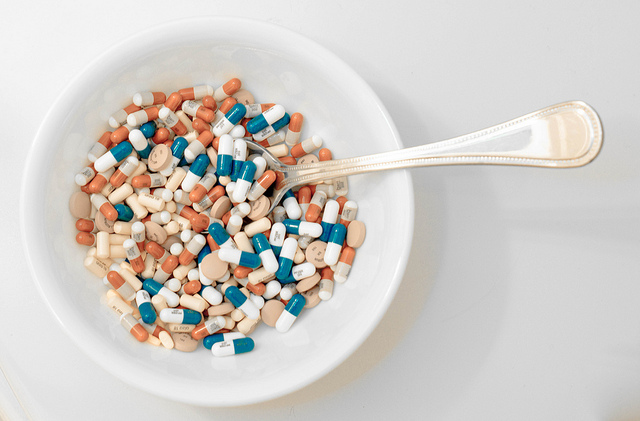**Editor’s note: This article represents one small sliver of the ongoing action and debate surrounding Big Pharma and antidepressant use. Please use it to help inform your perspective or contribute to constructive discussion if you wish, but consult a licensed doctor, psychiatrist or psychologist regarding any changes to your health care plan. elephant journal is not designed to, and should not be construed to, provide medical advice, professional diagnosis, opinion or treatment to you or any other individual, and is not intended as a substitute for medical or professional care and treatment.
According to the National Center for Health Statistics, the rate of adult antidepressant use has risen by nearly 400% in the last two decades.
Antidepressants are the third most frequently taken medication in the U.S..
We use antidepressants for a variety of reasons—ranging from depression, panic disorder and generalized anxiety to PMS, OCD and sexual dysfunction. Some seek antidepressants for otherwise untreatable, insufferable conditions.
We generally take them because we think that, one, they’ll work and, two, the possibility of them working trumps the risk of side effects.
But what if we knew that:
Pharmaceutical companies sometimes don’t know, underplay or conceal their antidepressants’ most serious side effects.
The manufacturer of Paxil, GlaxoSmithKline, reportedly paid $1 billion in 2010 to resolve 800 lawsuits alleging that they failed to warn doctors and mothers of Paxil’s heart defect risk in fetuses. Decades after they hit the market, only now do Paxil and other antidepressants carry a warning label for potential birth defects such as heart problems, irregular skull shape and abdominal abnormalities.
Antidepressants can adversely affect growing children, too—a fact few knew for years despite tens of millions of adolescent prescriptions.
Both GlaxoSmithKline and Forest Laboratories, manufacturer of Celexa and Lexapro, pleaded guilty to charges that they concealed clinical trial results revealing that their antidepressants posed suicide risks to children and adolescents.
According to The U.S. Department of Justice, Forest failed to discuss “the negative results of a contemporaneous double-blind, placebo-controlled European study on the use of Celexa in adolescents,” instead only promoting the positive trial.
Similarly, GlaxoSmithKline used one study to push that Paxil is “well tolerated and effective” for kids while concealing evidence of the opposite: that it’s ineffective and can trigger suicidal thoughts in adolescents. Legal discovery and a new analysis of their study revealed that GlaxoSmithKline’s conclusions were wrong and that they knew so all along, even hiring a PR firm to ghostwrite it.
Even though many antidepressants have proven dangerous for children and adolescents, America’s youth are three times as likely to be prescribed antidepressants than Europeans the same age.
Antidepressants can cause similar effects in adults.
One study showed that depressed adults taking Paxil were 6.4 times more likely to display suicidal thoughts and behavior than depressed adults taking a sugar pill. Such evidence is consistent with attorney Jeffrey Phillips’ observation that many of his clients “report feeling worse on antidepressants”.
Antidepressants aren’t nearly as effective as published clinical trials “prove”.
Uncovered data reveals that antidepressants aren’t nearly as effective as Big Pharma insists.
An analysis reviewing 74 trials involving 12 antidepressants published in the New England Journal of Medicine found that pharmaceutical companies never published the results of about a third of the drug trials they conducted—thereby wrongly winning FDA approval and “misleading doctors and consumers about the drugs’ true effectiveness,” according to The New York Times. “While 94 percent of the positive studies found their way into print, just 14 percent of those with disappointing or uncertain results did.”
When the analysis accounted for the unpublished trials, the drugs were found to be only marginally more effective than a placebo.
The study’s lead author, a psychiatrist and former F.D.A. reviewer who now works at Oregon Health and Sciences University, Dr. Erick H. Turner, notes:
The bottom line for people considering an antidepressant, I think, is that they should be more circumspect about taking it, and not be so shocked if it doesn’t work the first time and think something’s wrong with them.
Many think the possible side effects of antidepressants, even if not listed, are worth it. Without a doubt, sometimes they are. But we may be overusing them because we’re overly optimistic about their results. In truth, antidepressants are not a cure-all; they cure some.
The rest of us? It may be time to find other ways.
~~
Natural Remedies for ADHD (Alternatives to Ritalin & Adderall), via Herbalist Brigitte Mars.
Author: Caroline Beaton
Image: Flickr/Carsten Schertzer


 Share on bsky
Share on bsky





Read 37 comments and reply